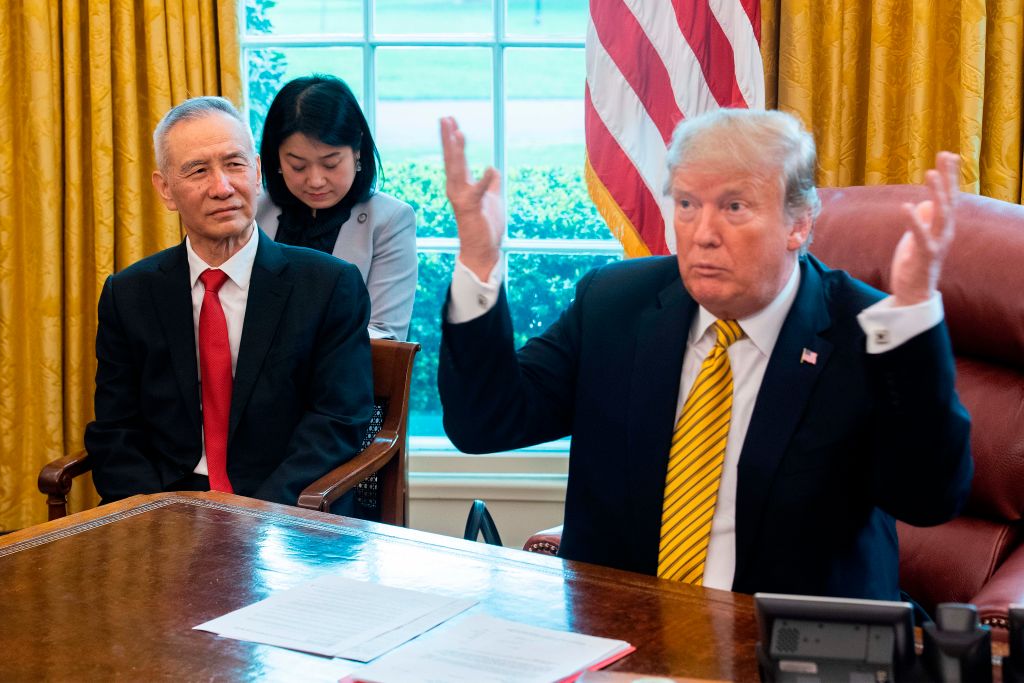Trump is wrong about tariffs and who is paying for them


A free daily email with the biggest news stories of the day – and the best features from TheWeek.com
You are now subscribed
Your newsletter sign-up was successful
President Trump threw another curveball into ongoing trade talks with China on Sunday, threatening to raise tariffs to 25 percent on $200 billion worth of Chinese goods. Trump was apparently tweeting out of frustration over Chinese resistance to some of his bigger demands; he succeeded in rattling U.S. investors, at least.
In his tweets, Trump again showed he either doesn't understand how tariffs work or, more likely, doesn't seem to think the reality is as politically palatable as his claims that for 10 months, "China has been paying tariffs to the USA," that "these payments are partially responsible for our great economic results," and that "the tariffs paid to the USA have had little impact on product cost, mostly borne by China." He's wrong on most counts.
First, tariffs are taxes paid to U.S. Customs and Border Protection by U.S. importers — that is, U.S. companies or U.S. subsidiaries of foreign companies — not by China. So, for example, Costco would pay the tax on TVs imported for China, explains Howard Gleckman at the Tax Policy Center. "But who really pays the tax on imported goods? The answer, I am sorry to say is, it depends."
The Week
Escape your echo chamber. Get the facts behind the news, plus analysis from multiple perspectives.

Sign up for The Week's Free Newsletters
From our morning news briefing to a weekly Good News Newsletter, get the best of The Week delivered directly to your inbox.
From our morning news briefing to a weekly Good News Newsletter, get the best of The Week delivered directly to your inbox.
Domestic companies typically deal with the extra tax through some combination of cost-cutting, eating the loss through lower profits, passing the cost on to consumers, asking the Chinese exporter to share the financial burden, or finding tariff-free countries to import from. Economists at the Federal Reserve Bank of New York, Princeton, and Columbia found in February that with Trump's tariffs, the entire burden has fallen "on domestic consumers and importers up to now, with no impact so far on the prices received by foreign exporters."
That study conservatively estimated that the tariffs are costing U.S. consumers and companies $4.4 billion a month. A Congressional Research Report found that Trump's tariffs raised the price of washing machines by as much as 12 percent. And China's retaliatory tariffs have harmed U.S. farmers, especially; despite subsidies to offset those losses, Midwestern farms are declaring bankruptcy at rates not seen since the 2008 financial crisis.
A free daily email with the biggest news stories of the day – and the best features from TheWeek.com
Peter has worked as a news and culture writer and editor at The Week since the site's launch in 2008. He covers politics, world affairs, religion and cultural currents. His journalism career began as a copy editor at a financial newswire and has included editorial positions at The New York Times Magazine, Facts on File, and Oregon State University.
-
 Sepsis ‘breakthrough’: the world’s first targeted treatment?
Sepsis ‘breakthrough’: the world’s first targeted treatment?The Explainer New drug could reverse effects of sepsis, rather than trying to treat infection with antibiotics
-
 James Van Der Beek obituary: fresh-faced Dawson’s Creek star
James Van Der Beek obituary: fresh-faced Dawson’s Creek starIn The Spotlight Van Der Beek fronted one of the most successful teen dramas of the 90s – but his Dawson fame proved a double-edged sword
-
 Is Andrew’s arrest the end for the monarchy?
Is Andrew’s arrest the end for the monarchy?Today's Big Question The King has distanced the royal family from his disgraced brother but critics claim a ‘fit of revolutionary disgust’ could still wipe them out
-
 TikTok secures deal to remain in US
TikTok secures deal to remain in USSpeed Read ByteDance will form a US version of the popular video-sharing platform
-
 Unemployment rate ticks up amid fall job losses
Unemployment rate ticks up amid fall job lossesSpeed Read Data released by the Commerce Department indicates ‘one of the weakest American labor markets in years’
-
 US mints final penny after 232-year run
US mints final penny after 232-year runSpeed Read Production of the one-cent coin has ended
-
 Warner Bros. explores sale amid Paramount bids
Warner Bros. explores sale amid Paramount bidsSpeed Read The media giant, home to HBO and DC Studios, has received interest from multiple buying parties
-
 Gold tops $4K per ounce, signaling financial unease
Gold tops $4K per ounce, signaling financial uneaseSpeed Read Investors are worried about President Donald Trump’s trade war
-
 Electronic Arts to go private in record $55B deal
Electronic Arts to go private in record $55B dealspeed read The video game giant is behind ‘The Sims’ and ‘Madden NFL’
-
 New York court tosses Trump's $500M fraud fine
New York court tosses Trump's $500M fraud fineSpeed Read A divided appeals court threw out a hefty penalty against President Trump for fraudulently inflating his wealth
-
 Trump said to seek government stake in Intel
Trump said to seek government stake in IntelSpeed Read The president and Intel CEO Lip-Bu Tan reportedly discussed the proposal at a recent meeting
